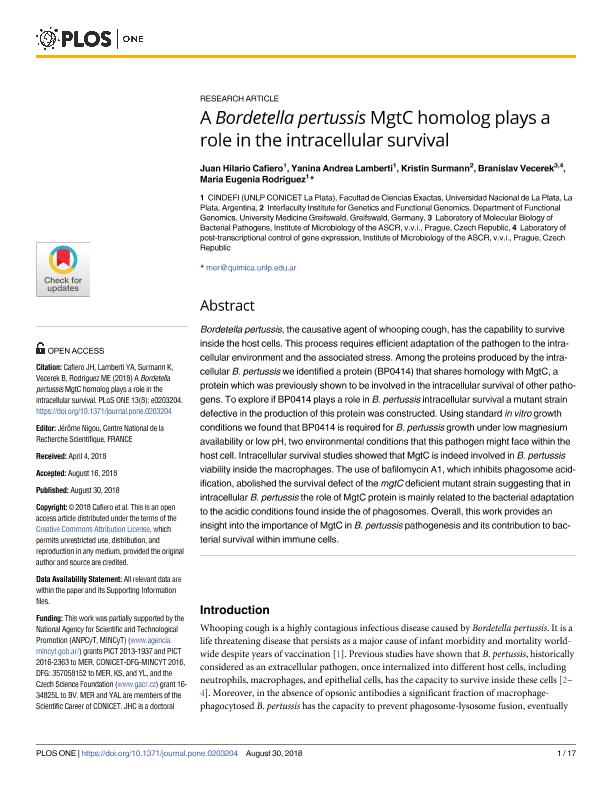Artículo
A Bordetella pertussis MgtC homolog plays a role in the intracellular survival
Cafiero, Juan Hilario ; Lamberti, Yanina Andrea
; Lamberti, Yanina Andrea ; Surmann, Kristin; Vecerek, Branislav; Rodriguez, Maria Eugenia
; Surmann, Kristin; Vecerek, Branislav; Rodriguez, Maria Eugenia
 ; Lamberti, Yanina Andrea
; Lamberti, Yanina Andrea ; Surmann, Kristin; Vecerek, Branislav; Rodriguez, Maria Eugenia
; Surmann, Kristin; Vecerek, Branislav; Rodriguez, Maria Eugenia
Fecha de publicación:
08/2018
Editorial:
Public Library of Science
Revista:
Plos One
ISSN:
1932-6203
Idioma:
Inglés
Tipo de recurso:
Artículo publicado
Clasificación temática:
Resumen
Bordetella pertussis, the causative agent of whooping cough, has the capability to survive inside the host cells. This process requires efficient adaptation of the pathogen to the intracellular environment and the associated stress. Among the proteins produced by the intracellular B. pertussis we identified a protein (BP0414) that shares homology with MgtC, a protein which was previously shown to be involved in the intracellular survival of other pathogens. To explore if BP0414 plays a role in B. pertussis intracellular survival a mutant strain defective in the production of this protein was constructed. Using standard in vitro growth conditions we found that BP0414 is required for B. pertussis growth under low magnesium availability or low pH, two environmental conditions that this pathogen might face within the host cell. Intracellular survival studies showed that MgtC is indeed involved in B. pertussis viability inside the macrophages. The use of bafilomycin A1, which inhibits phagosome acidification, abolished the survival defect of the mgtC deficient mutant strain suggesting that in intracellular B. pertussis the role of MgtC protein is mainly related to the bacterial adaptation to the acidic conditions found inside the of phagosomes. Overall, this work provides an insight into the importance of MgtC in B. pertussis pathogenesis and its contribution to bacterial survival within immune cells.
Palabras clave:
Bordetella pertussis
,
Intracellular pathogens
,
Macrophages
Archivos asociados
Licencia
Identificadores
Colecciones
Articulos(CINDEFI)
Articulos de CENT.DE INV EN FERMENTACIONES INDUSTRIALES (I)
Articulos de CENT.DE INV EN FERMENTACIONES INDUSTRIALES (I)
Citación
Cafiero, Juan Hilario; Lamberti, Yanina Andrea; Surmann, Kristin; Vecerek, Branislav; Rodriguez, Maria Eugenia; A Bordetella pertussis MgtC homolog plays a role in the intracellular survival; Public Library of Science; Plos One; 13; 8; 8-2018; 1-17
Compartir
Altmétricas



